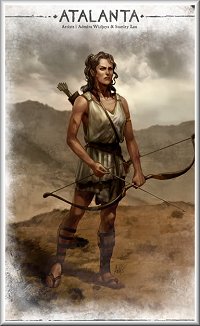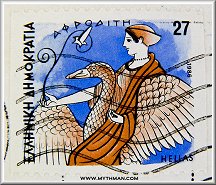
CLICK TO ENLARGE

CLICK TO
ENLARGE

CLICK TO
ENLARGE
|
APHRODITE PAGE THREE
(continued from page two here)
Aphrodite set in motion the Trojan War. She promised the
shepherd called Paris that Helen, the most beautiful mortal
woman in the world, would be his if Paris chose Aphrodite over
Athena and Hera in a beauty contest.
Paris took the bait, picked Aphrodite, and when Helen ran away
to Troy with Paris, the enraged Greeks gathered a mighty fleet
and army and attacked the great city. Thus began the Trojan War,
leading to the fall of mighty Troy.
Aphrodite would often help young people in love: Atalanta, a
virgin huntress, and swift as a deer, used to force her wooers
to race before her, but if she caught them she would put them to
death.
If anybody survived she would marry him. None lived.
A man named Melanion (also known as Hippomenes) had a crush on
beautiful Atalanta, but was astute enough to know he had no
chance to beat her in the race. After the young man beseeched
the Goddess of Love for her help, Aphrodite gave Melanion three
golden apples, which he scattered on the ground as he ran.
Atalanta could not help but stop to pick up the exquisite and
magical fruit, and was thus beaten in the race, becoming his
wife.
But Aphrodite wasn't all lovey-dovey. She could be harsh to
those who defied her. Because the Lemnian women did not honor
her, she inflicted a foul smell on them and caused their
husbands to consort with Thracian women.
The Lemnian women, abandoned by their husbands, killed all the
remaining men on the island and established a society of women.
When Aphrodite caught her lover Ares in bed with Eos (Dawn), she
cursed his lover with a constant longing for young mortals.
When the Sirens refused to yield their virginity to either
mortals or gods, Aphrodite turned them into birds.
Her power was immense, and her victims included many very famous
women in mythology, including Helen, Medea, Ariadne, Phaedra and
Hippodameia, to name but a few.
It's been written that Aphrodite's son was Eros (Love, Cupid), a
very wicked and mischievous boy some say, lacking all manners.
The brat spent his time in running all night from building to
building, and with his love arrows breaking up respectable
homes.
Nobody was immune to his capricious nature, not even Zeus, in
whom Eros often inspired sexual desires, which constantly got
him in trouble with his wife Hera.
Aphrodite's attendants were the Horae (Hours, Seasons, who are
worshipped as the wardens of the sky and of Olympus and are also
said to attend to the Sun god, Helios) and the Three Graces (Aglaia,
Euphrosyne and Thalia, known in Greek as the Charites); Flora
(goddess of vegetation) and Zephyrus (the west wind) were ready
to do her bidding as well.
She was the patroness of gardens and gardeners as well as
lovers. The myrtle was her tree; the rose, lily, hyacinth,
crocus and narcissus were also sacred to her.
Her animals were the swan, the dove, the sparrow and the
dolphin. The principal places of her worship in Greece were the
islands of Cythera and Cyprus, but she was revered just about
everywhere.
The presence of sanctuaries dedicated to Aphrodite on many
islands suggests that she was a West Asian goddess who was
brought to Greece by sea-traders.
Aphrodite appears to have been originally identical
with Astarte, the Phoenician goddess of fertility and
reproduction, whom the Hebrews called Ashtoreth.
The Romans called her Venus.

|







